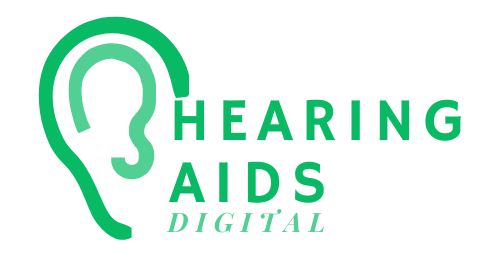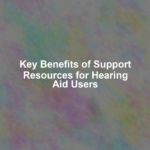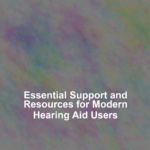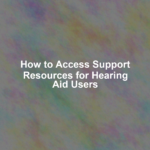When you first slip on a hearing aid, the worldG??s cacophony meets the quiet youG??ve known; itG??s a moment of sensory rebirth thatG??s both exhilarating and overwhelming.
As you navigate this new auditory landscape, youG??ll find that the device in your ear is more than just a piece of technologyG??itG??s a gateway to a life full of rich sounds and conversations.
But itG??s not always a seamless transition; thatG??s where support resources come into play. TheyG??re not just a nice-to-have, but a must-have, offering you personalized fittings, technical assistance, and the emotional backing needed to ensure youG??re not just hearing, but thriving.
You might wonder how these resources can impact your daily experiences and what happens when theyG??re not readily available. Consider the potential challenges and triumphs that lie ahead as you step into a world where support is as integral to your journey as the hearing aid itself.
Personalized Fitting and Adjustment
Upon receiving your new hearing aids, itG??s crucial to ensure theyG??re tailored to fit your ears and hearing needs precisely. YouG??ll want to work closely with your audiologist to customize your devices. TheyG??ll adjust them based on your specific hearing loss profile, which they measure through a series of tests.
During the fitting, your audiologist will program the hearing aids to match your hearing thresholds. YouG??ll experience sounds you havenG??t heard in a while, so itG??s normal to need some time to adjust. DonG??t hesitate to ask questions or express concerns; this is your time to get comfortable with your new aids.
Remember, your ears and hearing ability may change over time. YouG??ll need to go back for follow-up appointments to ensure your hearing aids continue to work effectively. If you notice any discomfort or feedback, let your audiologist know right away. They can make minor adjustments that can make a big difference.
Above all, be patient with yourself. Adapting to hearing aids can be a process, but with the right support and personalized adjustments, youG??ll soon appreciate the full benefits of your devices. Embrace the journey to better hearing!
Technical Support and Repairs
While personalizing your hearing aids is vital, knowing where to turn for technical support and repairs is equally important for long-term maintenance. Imagine youG??re in the middle of an important conversation and your hearing aid starts to malfunction. ThatG??s not just inconvenient; it can be incredibly stressful. ThatG??s why having a reliable source for technical support is crucial.
YouG??ll want to ensure youG??ve got access to professionals who can troubleshoot problems or guide you through basic maintenance tasks over the phone or via online chat. DonG??t underestimate the peace of mind that comes from knowing help is just a call or click away.
But tech support isnG??t all you need. Sometimes, hearing aids require hands-on repairs. You must have a trustworthy and accessible place for service, whether itG??s the retailer where you purchased your hearing aids or a certified repair center. Keep in mind, warranties and service agreements can be lifesavers, so make sure to keep such paperwork in a safe place.
Education and Training Programs
To maximize the benefits of your hearing aids, seek out education and training programs that teach you optimal usage and care techniques. These programs are designed to empower you with the knowledge you need to fully utilize your deviceG??s capabilities. YouG??ll learn how to adjust settings for various environments, troubleshoot minor issues, and maintain your hearing aids to ensure longevity.
YouG??ll find that many audiologists and hearing aid providers offer training sessions when you first get your device. DonG??t hesitate to take advantage of these opportunities. ItG??s also a good idea to ask about follow-up classes or refresher courses, as technology and your comfort level with the device may change over time.
Moreover, community centers and non-profits often host workshops and seminars for hearing aid users. These can be invaluable for staying up-to-date with new features and advancements in hearing aid technology. Joining a support group for hearing aid users can also provide a wealth of practical tips and emotional support.
Access to User Communities
Building on the foundation of education and training, connecting with user communities offers an added layer of support and camaraderie for hearing aid users. YouG??re not alone on this journey, and tapping into the collective wisdom and experience of others can be both empowering and enlightening.
HereG??s why you should consider joining a hearing aid user community:
-
Shared Experiences: YouG??ll find others whoG??ve walked in your shoes and understand the challenges and triumphs of living with a hearing aid.
-
Tips and Tricks: Members often share practical advice that can help you optimize the use of your hearing aids in various situations.
-
Emotional Support: Sometimes, you just need to vent or seek reassurance from people who get it. User communities can be a safe space for emotional support.
-
Advocacy and Awareness: By banding together, you can help raise awareness and advocate for better services and technologies.
Emotional and Psychological Support
Navigating the world with a hearing aid involves more than just adjusting to new sounds; it also requires ample emotional and psychological support to face the challenges that come with this change. YouG??re not just adapting to a device; youG??re reshaping your identity and how you interact with others. ItG??s a journey that can stir up a mix of emotionsG??from frustration and self-consciousness to hope and relief.
You might find yourself grappling with anxiety over the stigma of wearing a hearing aid or struggling with the fear of missing out on conversations. ThatG??s why itG??s crucial to have a support system in place. Whether itG??s family, friends, or a dedicated support group, these connections provide a safe space to express your feelings and share experiences.
Remember, itG??s okay to seek professional help too. A therapist who understands hearing loss can offer strategies to manage stress and improve communication. TheyG??ll work with you to build resilience, empowering you to face social situations with confidence.
Embracing this new chapter means recognizing that youG??re not alone. ThereG??s strength in seeking support, and with the right resources at your disposal, youG??ll navigate this transition more smoothly and reclaim the joys of hearing and connecting with the world around you.
Conclusion
YouG??ve learned how crucial support resources are for maximizing your hearing aid experience. Remember, personalized fittings ensure comfort and effectiveness.
Quick access to repairs keeps you connected. Education programs empower you to use your device confidently.
Joining user communities offers camaraderie. Most importantly, donG??t underestimate the value of emotional support to navigate challenges.
Embrace these resources; theyG??re your key to a world of clearer sounds and a fuller life with your hearing aid.








